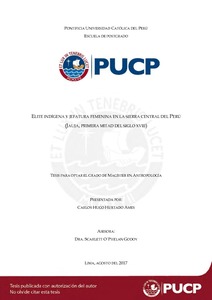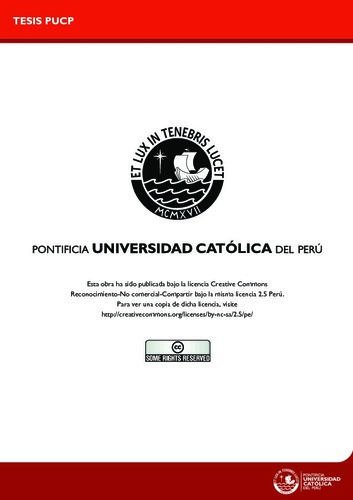| dc.contributor.advisor | O’Phelan Godoy, Scarlet Rebeca | |
| dc.contributor.author | Hurtado Ames, Carlos Hugo | |
| dc.date.accessioned | 2017-09-28T01:38:50Z | es_ES |
| dc.date.available | 2017-09-28T01:38:50Z | es_ES |
| dc.date.created | 2017 | es_ES |
| dc.date.issued | 2017-09-28 | es_ES |
| dc.identifier.uri | http://hdl.handle.net/20.500.12404/9402 | |
| dc.description.abstract | Esta tesis tiene por finalidad estudiar la elite indígena de la sierra central peruana,
específicamente del antiguo valle de Jauja, y la jefatura femenina durante la primera mitad del siglo XVIII. El punto de inicio del estudio es el análisis regional, por lo que se determinan las particularidades que llevaron a la situación específica que se vivirá en la región en este momento, principalmente la ausencia de ciudades y de una importante población española. Como parte de ello, se propone que la elite indígena de Jauja asumiría un rol protagónico y que llegaría a constituirse como una de las más importantes y complejas del virreinato peruano, además de tener distintos niveles de jerarquía. Para su consolidación en el poder, las principales familias indígenas recurrieron a la política de la alianza matrimonial. La principal razón de ello fue el acceder al cargo de cacique principal y gobernador. En un segundo momento, se examina las circunstancias por las cuales una mujer accede al cargo de cacique en dos de los cacicazgos que en la zona hubo, llegándose a constituir como cacica principal y gobernadora. Se propone que en ello se conjugaron varios aspectos, además de la ausencia de varones. Uno de ellos es la riqueza material de la señora en cuestión, que se contaba entre uno de los más importantes del virreinato. Otro, es el hecho que en Jauja existieron formas de sucesión que daban espacio para el acceso de las mujeres al poder, que se conocen como sucesión paralela y herencia femenina, que operaba hasta un momento del periodo colonial. | es_ES |
| dc.description.abstract | This thesis has the purpose to the study indiginous elites of the Peruvian Central
Highlands, specifically from the ancient valley of jauja, and the female chiefdoms
during the first half of the XVIIIth century. The starting point of the research is a
regional analysis, to determine the peculiarities which produced the specific
situation in the región at the time, mainly the abscence of cities and an important
spaniard population. As part of it, we propose that Jauja’s indigenous elites asume
an important role configuring itself as one of the most important and complex of
the Peruvian viceroy, besides having different hierarchy levels. To consilidate their
power, the main indigenous families practiced the politics of marriage alliances.
The main reason behind it was adquiring the Rank of main cacique and governor.
At a second instance, we examine the circunstances by which a woman adquires
the Rank of cacique in two of the dominions at the area, being able to act as main
curaca and governor. We propose that here several aspects merge, besides the
abscence of males. One of them is the material wealth of the lady in question,
counting as the most important of the viceroy. Anotherone, is the fact that in Jauja
there existed forms of succesion allowing women Access to power, known as
parallel succession and female heritage, in effect up to a certain time in the colonial
period. | en_EN |
| dc.language.iso | spa | es_ES |
| dc.publisher | Pontificia Universidad Católica del Perú | es_ES |
| dc.rights | info:eu-repo/semantics/closedAccess | es_ES |
| dc.subject | Mujeres indígenas--Perú--Historia--Siglo XVIII | es_ES |
| dc.subject | Caciques--Historia--Perú--Siglo XVIII | es_ES |
| dc.subject | Virreinato--Perú--Siglo XVIII | es_ES |
| dc.subject | Participación social--Perú--Siglo XVIII | es_ES |
| dc.subject | Estructura social--Perú--Jauja (Junín : Provincia)--Siglo XVIII | es_ES |
| dc.subject | Perú--Jauja (Junín : Provincia)--Historia--Siglo XVIII | es_ES |
| dc.title | Elite indígena y jefatura femenina en la sierra central del Perú (Jauja, primera mitad del siglo XVIII) | es_ES |
| dc.type | info:eu-repo/semantics/masterThesis | es_ES |
| thesis.degree.name | Magíster en Antropología | es_ES |
| thesis.degree.level | Maestría | es_ES |
| thesis.degree.grantor | Pontificia Universidad Católica del Perú. Escuela de Posgrado | es_ES |
| thesis.degree.discipline | Antropología | es_ES |
| renati.advisor.dni | 06660555 | |
| renati.advisor.orcid | https://orcid.org/0000-0002-7177-4471 | es_ES |
| renati.author.dni | 9951714 | |
| renati.discipline | 315017 | es_ES |
| renati.level | https://purl.org/pe-repo/renati/level#maestro | es_ES |
| renati.type | http://purl.org/pe-repo/renati/type#tesis | es_ES |
| dc.publisher.country | PE | es_ES |
| dc.subject.ocde | http://purl.org/pe-repo/ocde/ford#5.04.03 | es_ES |








